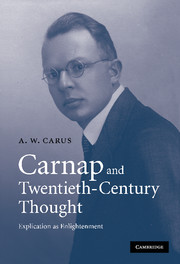Book contents
- Frontmatter
- Contents
- Preface
- Note on the style of citation
- Introduction
- 1 The cultural inheritance
- 2 The intellectual inheritance: positivism and Kantianism
- 3 The grand plan of a ‘system of knowledge’: science and logic
- 4 Carnap's early neo-Kantianism
- 5 The impact of Russell
- 6 Rational reconstruction
- 7 The impact of Wittgenstein
- 8 The crisis of rational reconstruction, 1929–1930
- 9 Liberation
- 10 Tolerance
- 11 The ideal of explication
- Bibliography
- Index
4 - Carnap's early neo-Kantianism
Published online by Cambridge University Press: 22 September 2009
- Frontmatter
- Contents
- Preface
- Note on the style of citation
- Introduction
- 1 The cultural inheritance
- 2 The intellectual inheritance: positivism and Kantianism
- 3 The grand plan of a ‘system of knowledge’: science and logic
- 4 Carnap's early neo-Kantianism
- 5 The impact of Russell
- 6 Rational reconstruction
- 7 The impact of Wittgenstein
- 8 The crisis of rational reconstruction, 1929–1930
- 9 Liberation
- 10 Tolerance
- 11 The ideal of explication
- Bibliography
- Index
Summary
A FIRST ATTEMPT
What sort of Kantianism is available to someone who holds that all mathematics, including geometry, is analytic? A version of Helmholtz's view, presumably – that the qualitative properties of spatiality, though not the axioms of geometry (which are underdetermined by qualitative spatiality), are synthetic a priori on the basis of something like pure intuition. And this is indeed what we find in the early Carnap. Even before the 1920 dissertation, it seems that his interpretation of Kant was largely naturalistic and Helmholtzian. As he recounts from his student days:
Once I gave a report in Bauch's seminar on this view of Kant [that the geometrical structure of space is determined by the form of our intuition]. I tried to show that it seems possible to generalise this conception considerably, because I saw an analogy between space on the one hand and systems of other features of sense qualities on the other. In particular, I tried to show that the three-dimensional structure of the system of colours, ordered according to their similarities, is determined by the form of our colour intuition in the same way in which the three-dimensional structure of space is determined by the form of our spatial intuition.
(UCLA 1957a, p. B2)What about the Marburg school? Carnap accepted its notion of the ‘object-creating function of thought’, as we will see below (p. 153).
- Type
- Chapter
- Information
- Carnap and Twentieth-Century ThoughtExplication as Enlightenment, pp. 109 - 138Publisher: Cambridge University PressPrint publication year: 2007

